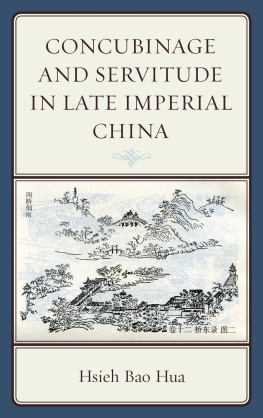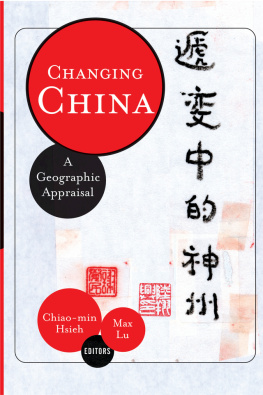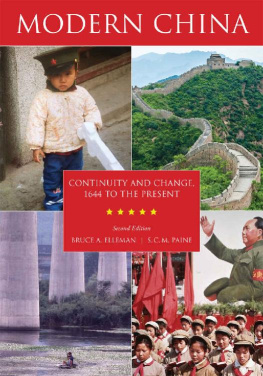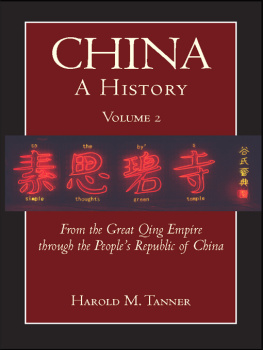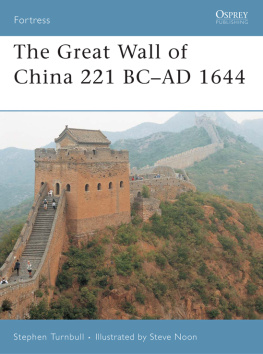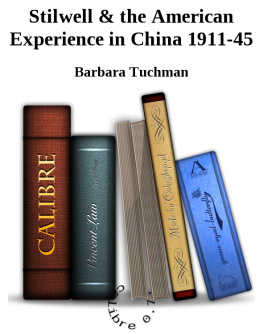ROUTLEDGE LIBRARY EDITIONS:
HISTORY OF CHINA
Volume 8
THE GOVERNMENT OF CHINA,
16441911
THE GOVERNMENT OF CHINA,
16441911
PAO CHAO HSIEH
First published in 1925 by Frank Cass and Company Limited
This edition first published in 2019
by Routledge
2 Park Square, Milton Park, Abingdon, Oxon OX14 4RN
and by Routledge
711 Third Avenue, New York, NY 10017
Routledge is an imprint of the Taylor & Francis Group, an informa business
All rights reserved. No part of this book may be reprinted or reproduced or utilised in any form or by any electronic, mechanical, or other means, now known or hereafter invented, including photocopying and recording, or in any information storage or retrieval system, without permission in writing from the publishers.
Trademark notice: Product or corporate names may be trademarks or registered trademarks, and are used only for identification and explanation without intent to infringe.
British Library Cataloguing in Publication Data
A catalogue record for this book is available from the British Library
ISBN: 978-1-138-48273-9 (Set)
ISBN: 978-0-429-45536-0 (Set) (ebk)
ISBN: 978-1-138-31668-3 (Volume 8) (hbk)
ISBN: 978-0-429-45550-6 (Volume 8) (ebk)
Publishers Note
The publisher has gone to great lengths to ensure the quality of this reprint but points out that some imperfections in the original copies may be apparent.
Disclaimer
The publisher has made every effort to trace copyright holders and would welcome correspondence from those they have been unable to trace.
THE GOVERNMENT OF
CHINA (16441911)
BY
PAO CHAO HSIEH
D EDICATION
To the Late Pao Tien Hsieh
the authors brother, friend, and
counselor, this book is dedicated.
C O N T E N T S
First Published 1925 by
F RANK C ASS AND C OMPANY L IMITED
Published 2013 by Routledge
2 Park Square, Milton Park, Abingdon, Oxon OX14 4RN
711 Third Avenue, New York, NY, 10017, USA
Routledge is an imprint of the Taylor & Francis Group, an informa business
Copyright 1925 by The Johns Hopkins Press
ISBN 13: 978-0-714-61026-9 (hbk)
PREFACE
Of all the Chinese puzzles, politics seems the greatest. The lack of scientific treaties on past political institutions makes a solution of this great puzzle much more laborious. It is chiefly for the purpose of presenting a clear background of the present political organization, and thus facilitating the study of the present government, (the actual working of which is largely based on the institutions of the past), that this volume is prepared.
The writer is contented with discussing principally the organization of the government, and only occasionally touching upon its operation. He regrets that he cannot further deal with the real working of the Manchu governing machinery, as the imperial archives are not accessible to him. Also for fear of making this work too lengthy for a handy volume, he has had to avoid going into too much of the detailed regulations of that administrative hierarchy. In the preparation of this volume, he is confronted with the danger of making it too technical for those who are not well acquainted with Chinese political institutions and yet at the same time not technical enough for those who are better informed.
To Dr. H. H. Chang and Dr. S. K. Hornbeck, the author feels deeply grateful for their help in reading over the manuscript and making a number of valuable suggestions. To Prof. W. W. Willoughby he is greatly indebted for constant advice, criticism and encouragement.
P. C. H.
Peking, October, 1924.
In ethics as well as in politics, Confucian theories, to the exclusion of theories of other schools, have dominated China for the last twenty-three centuries. A discussion of Chinese political theory is, therefore, primarily one of Confucius theories with incidental mention of the supplementary explanations made by his most famous disciple, Mencius, and by other followers of his teaching.
Being a writer on past institutions rather than one on a speculative future, and writing with the aim of stabilizing the traditional order, Confucius can hardly be accused, as many European political theorists have been, of hastening revolutions by building castles in the air. Indeed, Confucius never attempted to formulate a political panacea of his own contriving. The ancient practice of government formed the material on which he contemplated and wrote and from which he sought the betterment of the people. The existing state of things formed the basis upon which he prescribed a remedy. Practical statesman that he was, and because he had seen actual service, he clearly saw that the quickest and safest way of improving the political conditions of his period was to reinstitute the methods that flourished in the Golden Age of the ancient regime. He lived in the feudal age when strong feudal lords, though owing allegiance to the emperor, dominated by usurping the imperial authority. Five successful feudal lords wielded the imperial sceptor in different stages in the period of feudalism, as a result of military conquest; none of them, however, showed any willingness or intention to hand their illegitimate powers back to the legitimate possessor, nor was any of them able to put an end to the existing chaos by use of the powers he had usurped. Danger of war was threatening. Rivalry and strife had become the order of the day. Good institutions of the past seemed tumbling under the blows of the feudal struggle. A protracted period of peace, such as had existed during past dynasties, seemed an impossibility. Confucius saw the evils of decentralization and war: he sought to substitute for them centralization and peace.
The most conspicuous point of his philosophy, then, was monarchism as the means to centralization and peace. He compared the oneness of political authority in a state to the oneness of the sun in Heaven. This, however, should not be confused with absolutism of the monarch or divine right. This he objected to as much as to lawless force and disorder. But he made the monarch the center of his philosophy. Every phase of his political discussion took place on or around the monarch. By so doing, he aimed to make the institution of a monarch the commencement of stabilization. Here his practical knowledge of human nature was fully availed of. He did not try to glorify or deify the lucky or poor man on the throne; nor did he take away the heavy responsibility from him so as to make him unable to commit a wrong. To the monarch, the philosopher first gave wide powers, though his powers were to be modified by other institutions. First a liaison between the state and the family was made. The ruler was a king-father, the mandarins parent-officials, and the people children-people. The shrewd old scholar witnessed and believed in the fallibility of political institutions on the one side, and the infallibility of the family system on the other. By making this liaison he endeavored to imbue the organization of the state with some of the elements that made the family system stable, and his attempt proved a success. Thus, the patriarchal element within the Chinese monarchism checked the absolutism of the monarch. In all Confucius works, ethics was taught side by side with political theory; in many cases these two branches of human knowledge were so intermingled that it is almost impossible to separate one from the other. The three bonds conglomerations of political and social ethics, were always taught together: their traditional inseparability served in Confucian teaching as a solid example for the construction of the system.





